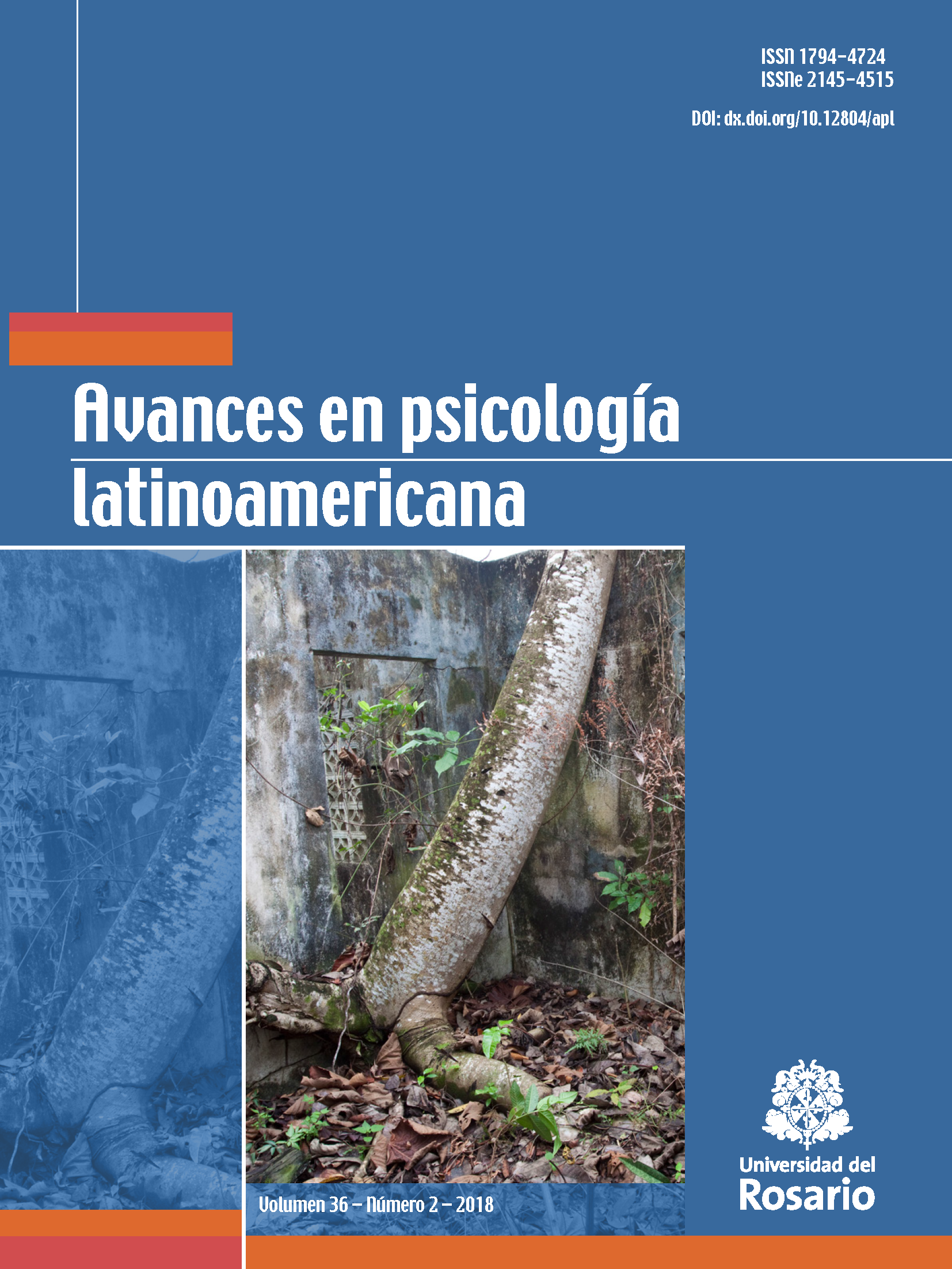Relación entre el rendimiento académico y el autorreporte del funcionamiento ejecutivo de adolescentes ecuatorianos
Barra lateral del artículo
Contenido principal del artículo
En el artículo se reporta una investigación que analizó la relación entre las funciones ejecutivas y el rendimiento académico de 250 estudiantes secundarios de Quito, Ecuador. Las mediciones utilizadas consistieron en la escala para evaluar funciones ejecutivas (Efeco) en el formato de autorreporte y el rendimiento académico del último año lectivo de los estudiantes. Se realizaron dos análisis: el primero de correlación sugiere que las funciones ejecutivas flexibilidad cognitiva (r = -0,18, p < 0,01), organización de materiales (r = -0,15, p < 0,01), monitorización (r = -0,22, p < 0,01), iniciativa (r = -0,24, p < 0,01), memoria de trabajo (r = -0,28, p < 0,01) y planificación (r = -0,25, p < 0,01) presentan una relación significativa e inversamente proporcional con el rendimiento académico (a mayor déficit en las funciones ejecutivas, menor rendimiento académico); el segundo análisis, basado en regresión múltiple, consideró a las funciones ejecutivas factores predictores del rendimiento académico, encontrándose una asociación estadísticamente significativa para el modelo testeado F(6,241) = 4,96, p < 0,001. El porcentaje de varianza que las funciones ejecutivas explican del rendimiento académico (r2 = 0,11) tiene relación con intervenciones realizadas previamente e invita a investigación futura en la que se realice un entrenamiento de las funciones ejecutivas para mejorar el rendimiento académico.
Descargas
Carlos Ramos, Universidad Internacional SEK Ecuador
- PSICÓLOGO INFANTIL Y PSICOREHABILITADOR - Universidad Central del Ecuador (2008)
- MAGÍSTER EN NEUROPSICOLOGÍA CLÍNICA Y REHABILITACIÓN NEUROPSICOLÓGICA - Universidad Central del Ecuador (2011)
- MAGÍSTER EN PEDAGOGÍA - Universidad Técnica Particular de Loja (2013)
- PHD EN PSICOLOGÍA (2015). Universidad de Concepción-Chile.
Alloway, T., Banner, G., & Smith, P. (2010). Working memory and cognitive styles in adolescents attainment. British Journal of Education, 78, 567-581.
Baars, M., Nije, M., Tonnaer, G., & Jolles, J. (2015). Self-report measures of executive functioning are a determinant of academic performance in first-year students at a university of applied sciences. Frontiers in Psychology, 6 (1131), 1-7.
Best, J., Miller, P., & Naglieri, J. (2011). Relations between Executive Function and Academic Achievement from Ages 5 to 17 in a Large, Representative National Sample. Learning and Individual Differences 21 (4), 327-336.
Blair, C., & Diamond, A. (2008). Biological processes in prevention and intervention: The promotion of self-regulation as a means of preventing school failure. Development and Psychopathology, 20, 899-911.
Clair-Thompson, H., & Gathercole, S. (2006). Executive functions and achievement in schol: Shifting, updating, inhibition, and working memory. Quarterly Journal of Experimental Psychology, 59, 745-759.
Damasio, A. (1994). El error de Descartes. Santiago de Chile: Editorial Andrés Bello.
Diamond, A. (2006). The early development of executive functions. En E. Bialystok, & M. Craik, Lifespan cognition: Mechanisms of change (págs. 70-96). New York: NY: Oxford University Press.
Di Francesca, D., & Nietfeld, J. (2016). A comparison of high and low achieving students on self-regulated learning variables. Learning and Individual Differences, 45, 228-236.
Espy, K., McDiarmid, M., Cwik, M., Stalets, M., Hamby, A., & Senn, T. (2004). The contribution of executive functions to emergent mathematics skills in preschool children. Developmental Neuropsychology, 26, 465-486.
Fuster, J. (2002). Frontal lobe and cognitive development. Journal of Neurocytology, 31 (3-59, 373-385.
García-Gómez, A. (2015). Desarrollo y validación de un cuestionario de observación para la evaluación de las funciones ejecutivas en la infancia. Revista Intercontinental de Psicología y Educación 17 (1), 141-162.
Giedd, J. (2008). The Teen Brain: Insights from Neuroimaging . Journal of Adolescent Health, 42, 335-343.
Gioia, G., Isquith, P., Retzlaff, P., & Espy, K. (2002). Confirmatory Factor Analysis of the Behavior Rating Inventory of Executive Function (BRIEF) in a Clinical Sample. Child Neuropsychology, 8 (4), 249-257.
Hernández, R., Fernández, C., & Baptista, P. (2014). Metodología de la Investigación. Sexta edición. México DF: Mc Graw Hill Education.
Holmes, C., Kim-Spoon, J., & Deater-Deckard, K. (2016). Linking Executive Function and Peer Problems from Early Childhood Through Middle Adolescence. Journal of Abnormal Child Psychology, 44 (1), 31-42.
IBM. (2011). SPSS Statistics. IBM Corp.
Jacob, R., & Parkinson, J. (2015). The Potential for School-Based Interventions That Target Executive Function to Imrpove Academic Achievement: A Review. Review of Educational
Researh, 85 (4), 512-552.
Knouse, L., Feldman, G., & Blevins, E. (2014). Executive functioning difficulties as predictors of academic performance: Examining the role of grade goals. Learning and Individual Differences, 36, 19-26.
Koechlin, E. (2016). Prefrontal executive function and adaptative behavior in complex environments. Current Opinion in Neurobiology, 37, 1-6.
Martínez, E., Lewix, S., & Moreno, M. (2006). Funciones ejecutivas en estudiantes universitarios que presentan bajo y alto rendimiento académico. Psicología desde el Caribe, 18, 109-138.
Mulder, H., & Cragg, L. (2014). Executive Functions and Academic Achievement: Current Research and Future Directions. Infant and Child Development, 23, 1-3.
Portellano, J., Martínez, A., & Zumárraga, A. (2009). Evaluación de las funciones ejecutivas en niños. Madrid: TEA Ediciones.
Ramos, C., & Lozada, J. (2015). ¿Los estudiantes universitarios tienen dificultades neuropsicológicas en el control de impulsos o en su monitorización? CienciAmérica, 4, 13-24.
Ramos-Galarza, C., Jadán-Guerrero, J., García-Gómez, A., & Paredes, L. (2016). Propuesta de la Escala Efeco para evaluar las funciones ejecutivas en formato de auto-reporte. CienciAmérica, 5 (1), 104-109.
Reyes, S., Barreyro, J., & Injoque-Ricle, I. (2015). El rol de la función ejecutiva en el rendimiento académico en niños de 9 años. Revista Neuropsicología Latinoamericana, 7 (2), 42-72.
Rosario, P., Núñez, J., & González-Pienda, J. (2006). Comprometer-se com o estudar no universidade: Cartas do Gervasio ao seu umbigo. Colimbra: Almedina.
Stevenson, C., Bergwerff, C., Willem, H., & Resing, C. (2014). Working Memory and Dynamic Measures of Analogical Reasoning as Predictors of Children´s Math and Reading Achievement. Infant and Child Development, 23 , 51-66.
Swanson, H., & Beebe-Frakenberger, M. (2004). The relationship between working memory and mathematical problem solving in children at risk and not at risk for serious math difficulties. Journal of Educational Psychology, 96, 471-491.
Tominey, S., & McClelland, M. (2011). Red Light, Purple Light: Findings From a Randomized Trial Using Circle Time Games to Imrpove Behavioral Self-Regulation in Preschool. Early Education and Development, 22 (3), 489-519.
Van der Ven, S., Kroesbergen, E., Boom, J., & Leseman, P. (2011). The development of executive functions and early matehematics: A dynamic relationship. British Journal of Educational Psychology, 82, 100-119.
Vergara, M. (2011). Funciones ejecutivas y desempeño académico en estudiantes de primer año de Psicología. Universidad de San Buenaventura: (Tesis de Maestria).
Williams, J. (2008). Revising the declaration oh Helsinki. World medical journal. 54 (4), 120-122.
Detalles del artículo
Los autores conservan los derechos de autor y garantizan a la revista el derecho de ser la primera publicación del trabajo al igual que licenciado bajo una Creative Commons Attribution License que permite a otros compartir el trabajo con un reconocimiento de la autoría del trabajo y la publicación inicial en esta revista.
Artículos más leídos del mismo autor/a
- Carlos Ramos, Claudia Pérez-Salas, Control inhibitorio y monitorización en población infantil con TDAH , Avances en Psicología Latinoamericana : Vol. 35 Núm. 1 (2017)







